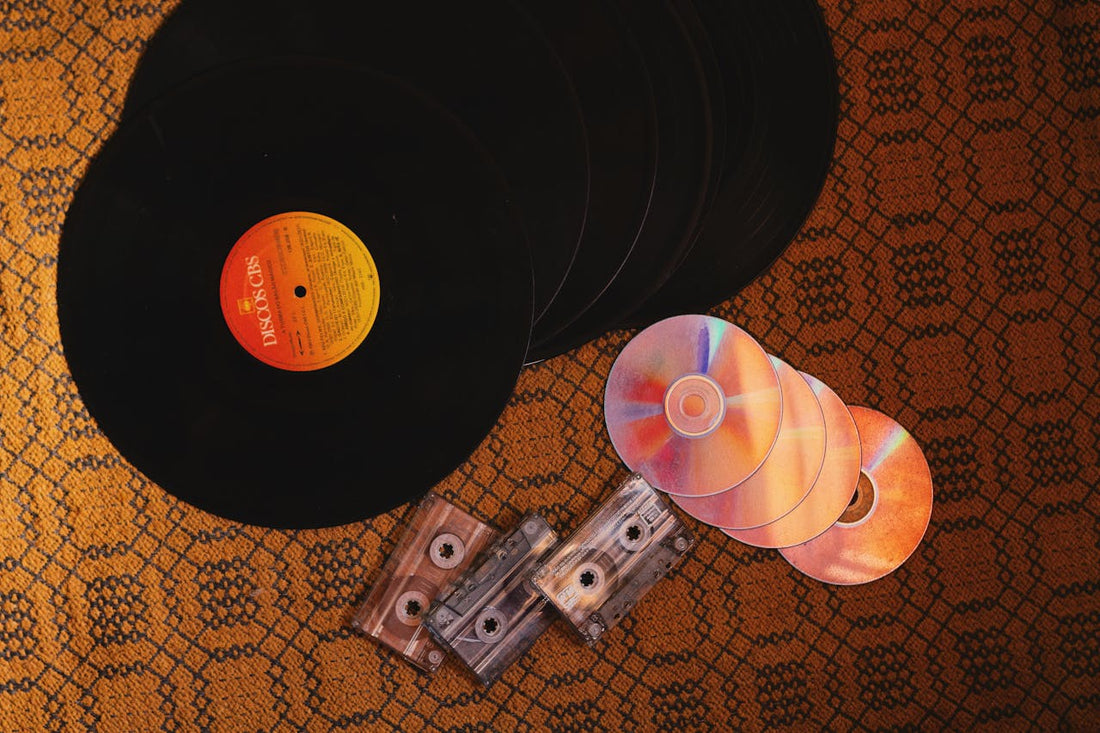
Vinyl Vs. CDs: What are the Differences?
Share
In a world where digital music reigns supreme, vinyl records and CDs stand out as two enduring physical music formats, each offering a unique listening experience. Whether you’re a seasoned audiophile or a casual listener, understanding the difference between vinyl records and CDs can deepen your appreciation for music. These music formats have shaped the music industry and listening habits over decades, each carrying distinct aesthetic and auditory qualities that appeal to different audiences.
In this vinyl vs CD comparison, we’ll cover various aspects like sound quality, portability, cost, and the overall listening experience, helping you decide which format best suits your audio preferences.
Sound Quality
The fundamental distinction in the audio world lies between analog and digital formats. Vinyl records are analog, which means they produce sound by mimicking the original audio waveforms. This results in a warm, natural sound that many audiophiles cherish despite its limitations, like pops, crackles, and a generally lower dynamic range.
On the other hand, CDs utilize digital technology to create a clean and precise sound, offering perfect fidelity. However, this crispness can sometimes feel sterile to some listeners. Despite these differences, some may not perceive a significant difference in quality, depending on their audio setup and sensitivity to sound variations.
Portability and Convenience
When considering vinyl vs CDs in terms of portability, vinyl records require more careful handling. They are bulkier and necessitate a turntable for playback. Their larger size and delicate nature make them more susceptible to damage like scratches, which can affect playback quality. However, getting the right vinyl protection and storage supplies shouldn’t hinder you from enjoying your classic vinyl records collection.
On the other hand, CDs offer an easier solution for those who value portability and convenience. They’re compact, easy to store, and far less prone to damage. CDs can also be played in numerous environments and devices, from cars to portable disc players, aligning better with modern, on-the-go listening habits. Their ease of storage also makes them ideal for most music enthusiasts.
Cost and Value
When comparing the cost of vinyl vs CDs, you’ll note that vinyl records are more expensive. This higher cost can be attributed to their elaborate production processes and materials. However, vinyl can also hold significant resale value, especially for collectible editions. CDs are usually cheaper to buy and maintain, though special or limited editions can also retain or increase in value over time.
The Listening Experience

Engaging with vinyl is often seen as a ritual. It involves selecting a record, placing it carefully on the turntable, and interacting physically with the music as you drop the needle. This process can enhance the emotional connection to the music. A closer look at how we interact with vinyl vs CDs shows that the tactile involvement starkly contrasts each other. While CDs are convenient in that they only require the disc to be inserted into a player, they often lack the personal touch offered by vinyl records.
Learn More About Vinyl Records
When comparing these two music formats, vinyl offers a more engaging listening experience that appeals to those who value tradition and physical interaction with their music. CDs provide a clean, convenient sound that suits more modern and practical listening preferences. With a clear understanding of vinyl vs CDs, you can now enjoy your favorite music in a format that aligns with your personal listening style.
Want to learn more about the difference between vinyl and CDs? Visit Big Fudge’s blog for more insights.


